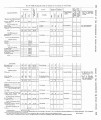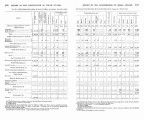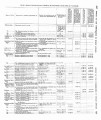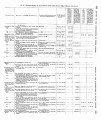| OCR Text |
Show the Department sees no reason to doubt that they will in a few years become a rich and prosperous people. They still follow the chase, the buffalo being their main dependence for food. Their wealth consists in horses (of which they own not lese than 12,000) and in cattle. They have, since their removal, begun farming to some extent., having already about 2,000 acres nuder cultivatio~~. Their a,gent reports the reservation L'poorly adapted for civilizing purposes," there being only one sluall valley of fertile soil, barely affording enough good farming-land for four thousand Iudians. Having but just located, they have at present but one school in operation, with an attendance of 38 scholars. Fnrther educational provision will be made for them at an early day. The only money these Indians have, besides the proceeds of the sale of their lands in Kansas, is the interest on $300,000, amounting annually to. $15,000, which is paid to t,hem in money, or expended for their benefit; and '$3,466, being the interest on $69,120, which sum is used for educational purposes. This interest is appropriated annually, per treaties of Jme 2, 1825, and September 29, 1865, and Senate resolu-tion of January 9, 1838. In addition to t,he item of $3,456 for educa-tional purppses, the Secretary of the Interior holds in trust for them United States and State stocks to the amount of $41,000, the interest on which sum, amounting aunuallg to $2,120, is also used for educa-tional purposes. Kiowas, Comanclres, alzd Apac1ies.-These tribes, confederated under present treaty stipulations, formerly ranged over an extensive country l ~ i n bge tween t.he Rio Grande and the RedRiver. As nearly a.s can be ascertained, they number as follows: Kiowas, 1,930 ; Comanches, 3,180 ; and Apaches, 380. They are now located upon a reservation secured to them by treaty madein11867, comprising 3,549,440 acres in the south-western part of the Indian Territory, west of and adjoining the Chicka-saw country. Wild and intractable, these Indians, eveu the best of them, have given s all signs of improvement in the arts of life, and, s~:bstantially, the #' hole dealing of the Govern~nent with them, thus far, has been in the way of supplyi~ig their necessities for food and clothing, with aview of keeping them upon their reservation and pre-venting their raiding into Texas, wit11 the citizens of whieh.State they were for many years before their present establishment on terms of mu-tual hatred and injury. The liberality and forbearance of the Goveru-ment since the treatv of 1867. when comvlete amnestv for the offellses of r11cs IHISI \SKIS es tci<l t~I,,)~ t i ~ e ~ne( ~i :~env.e<n, to t i i Q X ~ C IoI f~ ~ I I O W . i~l g th en^ to retain tlrci~.srolens tock, l~nren ot i)orur tile truiti ~xpected, and it mas be found necessarv. accordine to the o~iuione xmessed in :~uotllrrj, a;.t of this report, tu i)iiuF th~111'tn:I ael~sno i their'errom hy sercrr 1~1111ishmen1t1. 1 the opi~~ioI,Fu tllr Co~uu~issio~trheer, p oint bnj been reached where forbearance ceases to be a virtue. Some indi-viduals and bands have remained quiet and peaceable upon their reser-vations, evincing a dispositior~ to learn tho arts of life, to engage in agriculture, and to hare their children instructed in letters. To these every induce~nenits being held out to take np land and actively com-mence tilling it. Thus far they hme under cultivation but 100 acres, which have produced the past year a good crop of corn and potatoes. The wealth of these tribes consists in horses and mules, of which they own to the number, as reported by their agent, of 16,500, a great pro-portion of the aninlals notoriously having haen stolen in Texas. A boardinrc-school has been established uDon this reservation. having , . a11 artcndn~~CuLf 35 s~ho~a r\s~,i rLl,ast l~e'n gellr rQllorts, n reuiarkn~)~e degree ot'au~cess. It is struugly urged br Sopt-riuteudent TIuag, within |



































































































